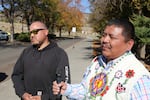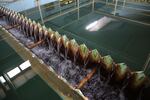Where safe running water isn’t a given, federal officials are tying solutions to embattled spending bills.
Democratic senators from Oregon brought officials with the Biden administration to rural Central Oregon last week — thousands of miles from the political fight in Washington, D.C., — to tour neglected water systems on the Warm Springs reservation.
U.S. Sens. Ron Wyden and Jeff Merkley made stops around the state to rally support for their party’s spending plans, before returning to high stakes negotiations in the capital this week.
The Senate-passed bipartisan Infrastructure bill includes a proposed $11 billion for projects to serve tribal nations, with $3.5 billion for tribal sanitation projects nationwide.
On the Warm Springs reservation, the spending could replace pipes and facilities that have long put human health, fish and other wildlife at risk by funding federal programs to replace a water main, a collapsed sewer line, and a 40-year-old drinking water treatment plant, where serious deficiencies were first reported by OPB in 2019.
“Soon, the Congress has a chance to make a real down payment on building a new system that fulfills America’s treaty obligations to Native American tribes,” Wyden said at a press conference after officials toured the Warm Springs drinking water plant earlier this month.

Sen. Ron Wyden, center, speaks at a press conference with Sen. Jeff Merkley, right, and Assistant Secretary of Indian Affairs Bryan Newland, left. The officials pledged support for federal infrastructure investment on the Warm Springs reservation, Oct. 15, 2021.
Emily Cureton Cook, Emily Cureton Cook / OPB
Wyden described computers running the plant as the “technology equivalent of baling wire.” He led a round of applause for Warm Springs’ Public Utility General Manager Chico Holliday, who has overseen emergency repairs over the last three years to keep the reservation’s water and wastewater systems functioning at all.
“I want to make this real straight forward,” Wyden said. “Those who have considered this land their home since time immemorial deserve more than boil your water notices.”
Warm Springs Tribal Councilor and Secretary-Treasurer Glendon Smith said that if the senators’ promises become reality, it would help restore some faith in the government.
“It would give people assurance that we’re going to have clean, drinkable water, and not have to go to bed worrying about if we’re going to boil water the next day, or if we’re going to get sick, continuously,” Smith said.
But the solutions proposed by Wyden and Merkley hinge on a still-raging political fight. A House vote on the infrastructure bill has stalled over separate legislation focused on social programs. The Build Back Better Act calls for sweeping federal spending on health care, child care, climate action and housing. But the cost — and the focus on climate action — have triggered opposition from some of the country’s most powerful Democrats, including West Virginia Sen. Joe Manchin and Arizona Sen. Kyrsten Sinema.

Warm Springs Tribal Councilor and Secretary-Treasurer Glendon Smith, right, and Public Utilities General Manager Chico Holliday, left, speak to reporters outside the tribal government offices on Oct. 15, 2021.
Emily Cureton Cook / OPB
Assistant Secretary for Indian Affairs Bryan Newland joined Oregon’s senators in centering Warm Springs in the national debate.
“We’re willing to put our money where our mouth is, and the president and the secretary [of the Interior] are in the fight with Congress to get this funding for infrastructure in Indian country,” Newland said, citing investments already made through the American Rescue Plan Act, a $1.9 trillion coronavirus relief package passed in March, creating historic revenues for county, city and tribal governments.
In the infrastructure and social spending fight, Oregon’s senators are uniquely well-positioned to influence the nation’s purse strings. Wyden chairs the Senate Finance Committee, and Merkley chairs the appropriations subcommittee funding the Interior Department, which includes the Bureau of Indian Affairs and Bureau of Land Management.
Related: The cost of clean water in Warm Springs
Of the $11 billion in proposed tribal infrastructure spending, some $3.5 billion would address tribal water sanitation projects backlogged under Indian Health Services’ Sanitation Facilities Construction Program, Merkley said.
“We appropriated enough money to be able to cover, hopefully, everything on that list across the nation,” Merkley said. “The rest of that $11 billion goes to things like rural broadband on reservations and climate resilience, which many tribal leaders have been raising.”
His remark coincided with a week of climate protests and arrests in Washington, D.C., led by Indigenous activists who oppose fossil fuel development. On Oct. 14, security personnel at the Department of the Interior stopped protesters attempting to enter the building, the Washington Post reported.
Another bill aimed at helping Warm Springs rebuild water systems could get funding through the infrastructure legislation. The Western Tribal Water Infrastructure Act passed the Senate in April, and has been championed by Wyden. It authorizes, but doesn’t pay for, $250 million through the Environmental Protection Agency for tribal water projects in Oregon’s Columbia River Basin and in the Upper Missouri River Basin.
“This legislation will directly help Warm Springs with the new pipes and the pumping infrastructure to deliver clean, clear drinking water to folks here,” Wyden said.
This bill hasn’t moved in the House, where Warm Springs is served by U.S. Rep. Cliff Bentz, a Republican from Eastern Oregon. Bentz has not publicly expressed support. His press secretary did not respond to two emailed requests for comment.

Treatment on the Warm Springs reservation is complicated by the technical demands of using surface water from a river.
Emily Cureton / OPB
